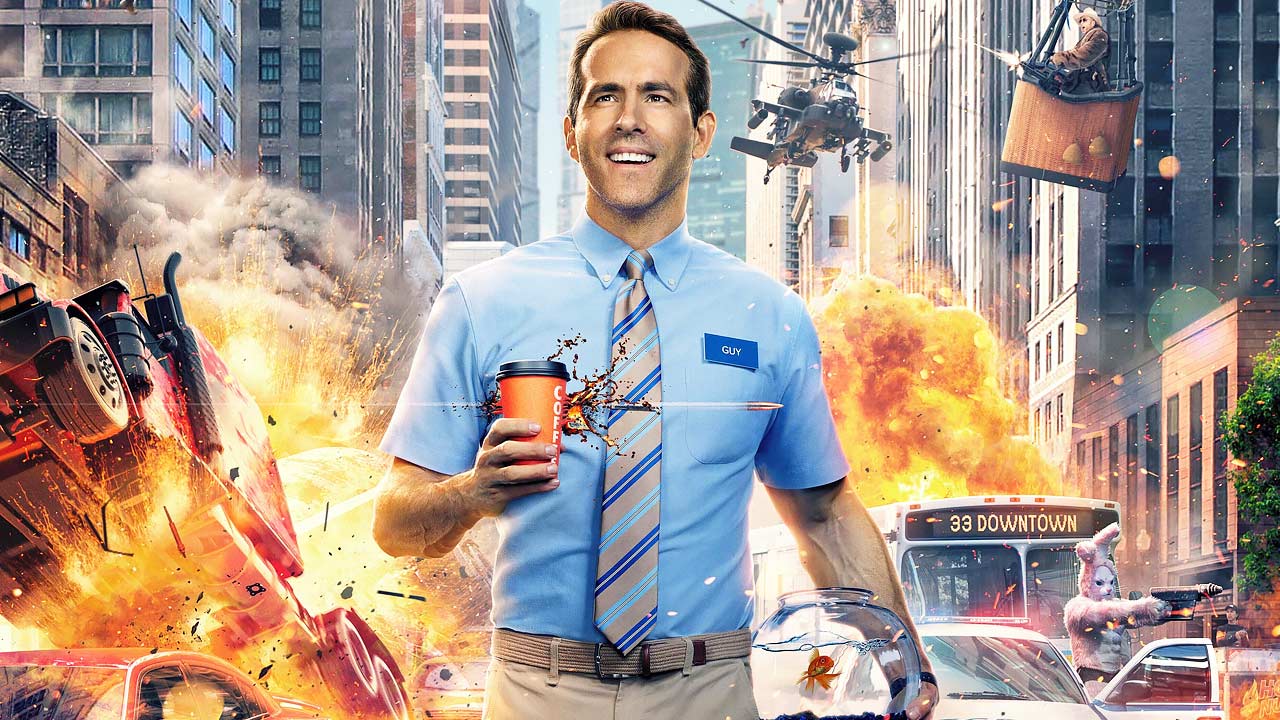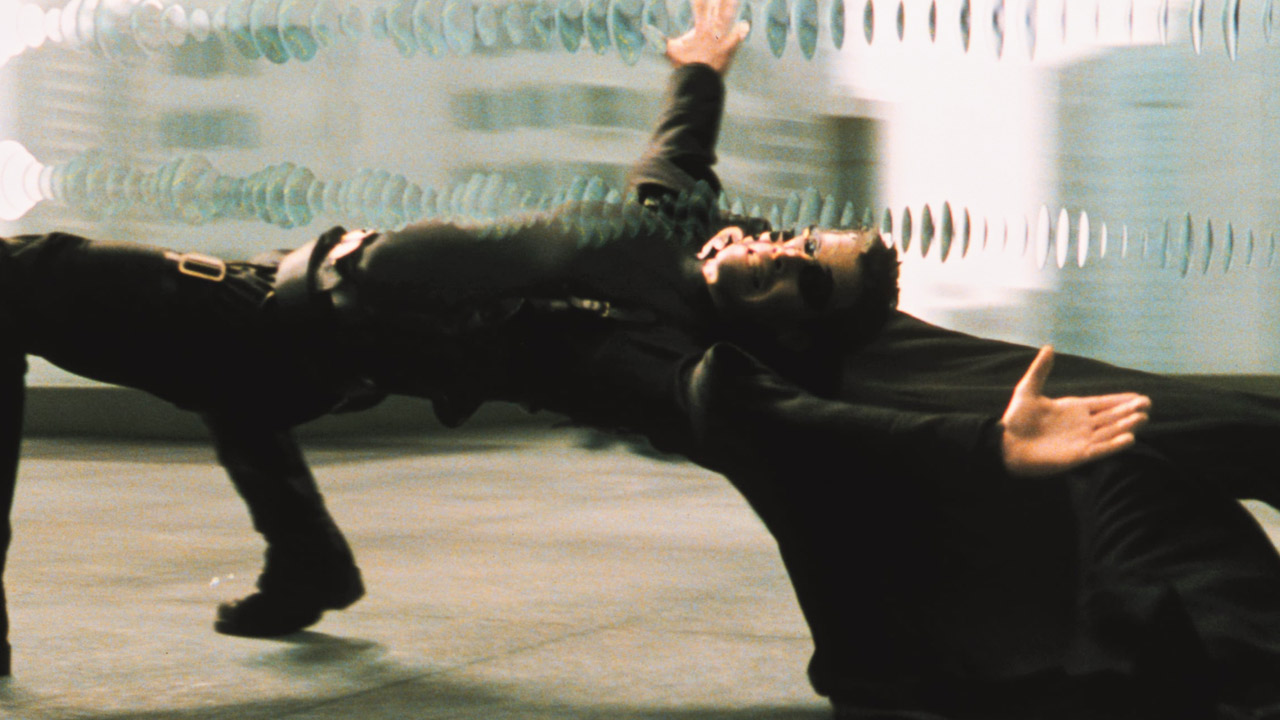Free Guy and the matrix-busting joys of the simulation movie

Free Guy is the latest addition to the genre of the simulation movie—home of Neo, Truman Burbank and an algorithm played by Don Cheadle. Luke Buckmaster gulps down a red pill and delivers a crash course on what to expect from films that tell us reality is merely an illusion.
Powered by a script that has the whiff of writing that was once inventive—even daring—but became increasingly watered down and studio-compromised, Free Guy is about a strip of code that becomes sentient—rendering itself in the form of Ryan Reynolds. The protagonist, Guy, is inoffensively bland because a) he’s played by Ryan Reynolds, and b) he’s a tiny side part in somebody else’s narrative—an ‘NPC’, which in video game parlance means ‘non-playable character.’ The virtual equivalent of an extra.
Director Shawn Levy’s daffy middle-of-the-road action movie is the latest production to join the genre of the simulation movie—and not the only popular one in recent times. This year also saw the arrival of the IP-raiding Space Jam: A New Legacy, in which Don Cheadle hammed it up as a villainous algorithm who sucked LeBron James and his son into Warner Bros.’ server, then ping-ponged them through the studio’s back catalogue.
It wasn’t your straight-up Matrix-esque simulation movie—but then again this genre takes on many permutations. Simulation movies are not always good, of course, but I have a soft spot for them, and most of the time they’re at least momentarily interesting. So, what are the key themes and cinematic elements they share?

Read on, you nondescript glob of data rendered in human form, and remember, I can only show you the door: you’re the one who has to walk through it. Or just pop a red pill and be done with it.
Characters trying to break free from simulated existence
It’s that old, everyday, Seinfeldian conundrum: what do you do when you’ve just discovered the world around you is a badly programmed illusion, disguising the true nature of the universe? The obvious response is to try to exit the virtual world and enter the real one.
This desire forms the motivation of the villain in Tron: Legacy—a computer program unsatisfied with remaining in a retro-futuristic electric blue pinball machine, thereby launching a nefarious plan to turn a virtual army into a real one. It doesn’t go smoothly, because exiting simulated existence is easier said than done—except if your name is Truman Burbank.
All the protagonist of Peter Weir’s 1998 classic had to do was put up with a bit of bad weather then walk up a flight of stairs. Neo, for that matter, had it easy also: swallow a pill, tolerate Morpheus’ pseudo-philosophical waffling, then either slow down time and kick arse, or unplug from The Matrix and attend sweaty raves in Zion, where the drugs must presumably be very good to make that doof music tolerable.

For a character like Guy, however, exiting the simulation is difficult or impossible, given he was ‘born’ in a video game and never had a material body. I’m not sure if this is better or worse than the predicament confronting poor Jake Gyllenhaal in Source Code, whose character does have an actual body, but it’s jiggered beyond repair: on life support and hooked up to neural sensors. In his case, you wouldn’t want to leave the simulation even if you could.
Messing with reality: let the spoon bending begin!
Before the desire to exit the illusionary world kicks in, a character who discovers they are in a simulation often, after a bit of stressing out, learns to have some fun with it. Enjoying a simulated existence generally involves messing around—like that spoon-bending show-off kid in The Matrix, or Truman Burbank when he discovered he could control the rain.
Ryan Reynolds loosens up about half an hour into Free Guy when he realises he is in effect immortal, waking up in his bed everyday like Phil from Groundhog Day no matter how spectacularly he gets killed. In an entertaining montage Guy embraces his inner action movie hero, taking down robbers, saving a little girl, and going on a motorbike joyride, appropriately behaving like a dude who just realised he lives in a video game.
But it’s not all shits and giggles in simulation movies; some characters have no fun at all. Gyllenhaal, playing a military man tracking down a terrorist, was a consummate professional in Source Code. So was Tom Cruise in Edge of Tomorrow, dying violently again and again and again in order to research how humankind can win a war against aliens. Didn’t know that one was a simulation movie? It has to be; Reddit says so.
Rufus Sewell also had a lousy time in Dark City, at least initially. He discovers he’s in a simulated universe (a city rearranged by telekinetic aliens in order to mess with people’s minds) at roughly the same time he learns he’s wanted for a brutal murder. Eventually he develops awesome powers and sees the bright side of things, declaring to Kiefer Sutherland’s mad scientist that he can “make this world anything I want it to be.” That’s the spirit.
Tossing around big philosophical ideas
Another reason I’m partial to simulation movies: they offer big, chewy philosophical questions, usually conferred in a slightly nutty spirit. One idea that pops up from time to time, reflected in the famous steak scene from The Matrix, involves the relationship between knowing something isn’t there but feeling that it is. Suppose our universe is indeed a computer simulation. If everything about it feels real, what stops it from being real? If the sensation exists, why does the source material matter?
This idea was addressed at the beginning of Bliss, a bizarre simulation movie released on Prime Video earlier this year. It blurs the line between what is, or may be, a simulated universe and what is, or may be, mental illness experienced by Owen Wilson’s protagonist: an office worker who accidentally kills his boss then meets a telekinetic Salma Hayek at a bar. Wilson waxes philosophical in the very first scene, drawing a doodle at his desk while he melancholically reflects via voice-over that “I don’t know if any of it is real. But it has a feeling, and the feeling is real.”

Sometimes these chewy philosophical questions relate to—as Douglas Adams would put it—life, the universe and everything, including the existence of God. The question of how a benevolent God could allow the existence of evil is an oldie but a goodie. Tyler Durden in Fight Club took it in a dark direction when he asked us to “consider the possibility that God does not like you. He never wanted you. In all probability, he hates you.”
Free Guy takes a different approach to this whole theology thing, asking us to consider the possibility that God might not even know we exist, and therefore doesn’t know they exist either—as a God at least. The almighty creator could just be some schlub who worked on a video game and accidentally conjured up the universe during whatever his reality’s equivalent of eating pizza is.
Simulation movies even help us understand movies that previously didn’t make sense. Groundhog Day, for instance, never explained why Bill Murray’s character was stuck repeating the same day over and over, before breaking the spell by becoming an expert piano player and performing various good deeds for townspeople. In hindsight he was obviously levelling up; progressing through the annoying video game known as ‘human existence’.
Which, of course, is the one you are playing right now. But don’t do anything too rash with that knowledge, you glorified extra in some higher entity’s fave video game—and go easy on the pills.

















